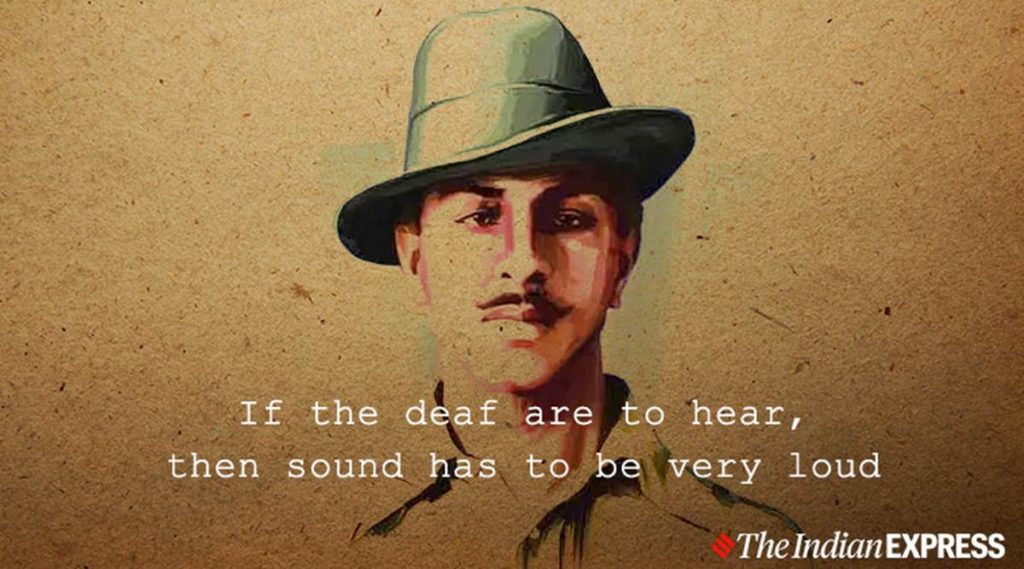Nazirul Hasan Ansari
(This article is being reproduced from Mainstream, 9 October 2007)
Remembering Bhagat Singh on the sixtysecond anniversary of his glorious and heroic martyrdom (March 23) cannot be a ceremonial or routine affair today. When the entire country, plagued as it is with the Hindutva brand of communalism in its worst-ever ferocity and perfidy, is yet to overcome the trauma of the Ayodhya tragedy and the horrendous communal carnage that rocked large parts of this subcontinent thereafter, Bhagat Singh’s words are of particular relevance for our nation and polity.
In the backdrop of the environment obtaining in India today, it would be most appropriate to study some of the passages of his Sampradayik Dange aur Unka Elaj (Communal Riots and the Remedy) that came out in print in the journal Kirti in 1927. It is no essay in academic flair, but it exudes Bhagat Singh’s deepest human concern for the Indian people who were then, as now, suffering due to senseless human killings in the name of religion. Here are a few excerpts from the article (all translations are mine – NHA):
…. The condition of India has now become extremely grave. The followers of one religion have become suddenly sworn enemies of the followers of the other religion. So much so, that to belong to one particular religion is reason enough for becoming enemy of the other religion. Such a feeling has gained currency.
…. If still someone harbours any doubts about the gravity of the situation, one should look at the recent riots of Lahore to gauge and determine the savagery and ferocity of the killings…. How Muslims have killed innocent Hindus and Sikhs and how Sikhs have been unsparing in their killings, deploying their best capabilities. Such brutal mutual killings have not been resorted to by the killers to award punishment to someone found guilty of some crime, but for the simple reason and for the fact that someone was either Hindu, Sikh or Muslim. For Muslims, it has been enough to kill if someone was either Hindu or Sikh and likewise to be a Muslim was sufficient reason for his being killed.
Apart from his deep anguish that can be seen in the lines below, Bhagat Singh also underlined the supine subterfuges of the leadership in face of horrendous communal criminality:
…. When the situation has reached this aggravated stage, then God alone knows what will happen to India. In view of the obtaining situation, India’s future appears extremely bleak. These religions have wrought havoc on India and one does not know when the scourge of such horrendous communal riots will come to an end and India will be freed from them—from such religious riots…. At the moment political leaders of India are conducting themselves so shamelessly. Those very leaders, who had sweared and vowed to liberate the country and had proclaimed of shouldering the great responsibility for that purpose, never tiring of talking about ‘common nationality’ and who had been vociferous in declaring their faith in the attainment of “Swaraj”, so unflinchingly and devotedly in the past, these very same leaders are now either keeping mum with their heads bowed in shame or are swaying along with the raging wind of blind religious bigotry.
Expressing his concern he added :
…. It appears as if the Indian political leadership has gone completely bankrupt.
Bhagat Singh’s worst fears have now come true, and the future of India appears as bleak at the hands of its ‘bankrupt’ political leadership.
About the role of newspapers Bhagat Singh had opined:
…. Those others, instrumental in fomenting communal riots, and playing the key-role in it, are newspapermen. The profession of journalism, considered to be esteemed once upon a time, has now been reduced to rubbish. They are blaring out against each other in screaming headlines, besides inciting people’s savage bigoted passions for unleashing the orgy of mutual killings.
Nothing appears to have changed since then vis-a-vis the morality and integrity of newspapers. Bhagat Singh himself wielded a powerful pen, he was a prolific writer and journalist within his own rights, having his stint in several papers from Kirti to Ganesh Shankar Vidyarathi’s Pratap. He had this to say about the duty and responsibility of newspapers before charging them with dereliction of a sacred duty.
…. The real duty of the newspapers is to educate, to cleanse the minds of people, take them out of the rut of narrow sectarian grooves of thought and perception, and to wash and scrap out communal feelings in order to invest them with feelings of amity and communal harmony, for bridging the gap and building mutual trust, bringing about real rapprochement for advancing the cause of common nationalism.
…. But instead of it all, their main objective appears to have become spread of ignorance, proliferation and propagation of chauvinism and sectarianism—communalisation of people’s mind for engendering group clashes and skirmishes. In this way they are working for destruction of India’s common heritage and its composite culture—its common nationalism….
How fully these words apply to the Indian print media of our own times, will have to be measured by mediamen themselves. What, however, bears pathetic resemblance to the overall situation of present-day India is Bhagat Singh’s painful observation, in conclusion:
…. This is the reason, while looking at the situation obtaining in India at the moment and after pondering over it, one sheds tears of blood and the most crucial question crops up in one’s mind, as to what is going to happen to India ultimately? What is going to become of this country?
How to combat communalism? Bhagat Singh stated:
…. In order to stop the people from mutual fighting, class consciousness is needed. The toiling poor, working classes and the peasantry should be made fully aware of the fact that their real enemies are capitalists; therefore they should desist from doing anything at their behest and remain ever-vigilant from falling prey to their vile machinations, being always on guard against becoming the tool of the capitalists.
In his exhortation for all-in unity of the toiling people, he said:
…. Let people be roused to the consciousness that basic rights of all the poor, the world over, irrespective of race, caste, colour, nationality and country are one, hence their salvation and prosperity lies in their joint struggle. They should therefore work to eradicate and remove all racial, national and religious prejudices, differences and distinctions and unite to seize for themselves, the power of governance.
Placing his optimism in the ultimate triumph, he added:
…. People must be told that they will be no losers in this struggle and their chains would be broken some day and they will attain freedom and economic emancipation.
Instead of concluding his article on a gloomy note, Bhagat Singh articulated remarkable optimism, reposing his hope and faith in the youth of India and appealed to his countrymen “with folded hands to pay heed to his suggestions”. He noted with happiness and satisfaction:
…. Welcome changes are quite discernible in the minds of the Indian youth now and they are distancing them from such religions which are engaged in fomenting mutual conflict and fostering hatred. The youth have now become so outspoken and forthright, that they do not look at the Indian people from the religious angle—as Hindu, Muslim or Sikh. They are now regarding all Indian people first as human beings and then Indians. Articulation of such a viewpoint by the Indian youth is indicative of the ensuring bright future of India.
Calling upon the Indian people to remain steadfast and dauntless in the face of the communal menace, he wrote:
…. The Indian people should not lose heart in face of communal riots; instead they should harness all their resources and potentials and exert by all possible means to create a new ethos and climate where recurrence of communal riots becomes impossible.
While paying rich tributes to the Ghadar party and its heroes in his article, Bhagat Singh underlined the ideological significance of this heroic movement that lay in the Ghadarites’ clear-cut attitude towards religion vis-à-vis politics; and their strikingly imaginative position on the most vexed yet vital issue:
…. The martyrs of 1914–15 had separated religion from politics and were convinced that religion was the private affair of an individual; hence none should be permitted to interfere with it. And likewise religion should also be debarred from encroaching in politics because once it is mixed up, it can’t work in unison in the same arena.
…. It was because of this that a movement like the Ghadar Party remained integrated and united, in which Sikhs topped the list of those attaining martyrdom, but Hindus and Muslims also did not lag far behind.
Bhagat Singh’s most serious concern over communalisation of politics led him to look to different quarters in quest of people and parties that could be united to fight the menace and welcome political leaders with non-communal secular outlook:
…. At the moment some of our Indian leaders have emerged on the scene who are advocating separation of religion from politics, which is the real remedy to eradicate the communal malady. We support this position. If religion is separated from politics we can come together in political matters while remaining aloof from the religious point of view.
The article ends with this impassioned appeal to his compatriots:
…. Well-wishers of India would think over the remedy I am suggesting and should come forward to save India from the disastrously suicidal course it is being pushed in.
He fought against communalism with the clear perception that it was primarily aimed against the poor who were struggling for their emancipation, social, political, economic and spiritual. For Bhagat Singh secularism, Hindu–Muslim unity and communal harmony were not just clichés for coaxing and cajoling the exploited and the ignorant. They were life-giving ideals, for the realisation of which lives could be sacrificed without hesitation or reservation.
Bhagat Singh urged upon the youth to go to the masses of workers and peasants. In their joint letter that Bhagat Singh and his comrade-in-arms, B.K. Dutt, sent to the delegates of the Punjab Students’ Federation conference, and which was read out in the second session of the conference on October 11, 1929, presided over by Subhash Chandra Bose, they pointed out that what was much more important than bombs and pistols for the youth was to spread the revolutionary message to the nook and corner of the country, to the factories and fields—the message to one and all to join the freedom struggle; and it was the bounden duty of the students to go to the poor living in dirty slums, and rouse them to action. It was a time of trial for the youth, they said, and expressed their faith that in the name of the great martyr, Jatindra Nath Das, our student brethren would be able to prove their mettle in the crucible of the freedom struggle. This letter was later published in the English daily, Tribune, in its issue of October 22, 1929.
Imbibing the spirit of this letter, why cannot our students today reach every hearth and home of the common toiling Indians and spread the message of Bhagat Singh against the menance of communalism and religious fundamentalism? Why can’t a month-long ‘mass education campaign against communalism’ in honour of Bhagat Singh and his comrades-in-arms be launched and made a permanent feature of the activities of student and youth every year?
(The author was a noted communist leader of UP and worked among the weavers of the State for many years. He passed away in Lucknow in March 2004.)




